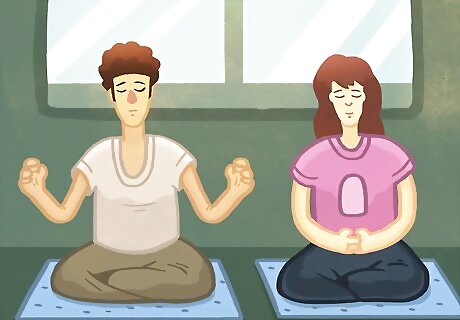
views
Changing Your Way of Thinking

Create a positive and hopeful mindset. Negative thinking can make the world seem dimmer than it really is. Positive thinking, on the other hand, helps improve your mood, motivation, and spirituality. Before you start doing positive affirmations, you may find it helpful to work on turning negative thoughts into neutral thoughts. For example, if you are thinking to yourself, “I am going to fail this test,” then you could make the thought neutral by saying, “I may not get an A+, but I will probably pass the test.” After you have mastered neutral thinking, work on turning negative or neutral thoughts into positive ones. For example, if you’re thinking, “I am so stressed. I'll never get this all done,” you might think instead, “I can do this. If I work hard, I will get everything done.” If you tend to catch yourself thinking about the worst-case scenario, instead try asking yourself, "What's the best that can happen?"

Develop a sense of curiosity. Curiosity helps you explore the world around you in new ways. It can help you notice things that you might have taken for granted. Aim to be more curious and thoughtful in your daily life. Ask questions when you encounter something new. For example, if you see an interesting-looking building, try to find out what it is for. If you can’t get the answer right away, look it up in a book or on the internet. Don't just accept things as they are. Look at your home or the world around you, and question why things work the way that they do. For example, ask yourself how your printer works or find out what your clothes are made of.

Appreciate the blessings in your life. Gratitude can help you think more positively about the world around you, and it helps you understand the good things in your life, even if things aren’t going well in the moment. Every day, identify 1 thing in your life that you are thankful for. Try keeping a daily gratitude journal where you write down something each day that you're thankful for. Read through the journal when you are feeling down or upset. If there is someone in your life who is important to you, make sure that they know. Thank them for their presence and for their support. Some things you might be grateful for include your health, your home, your family, your education, your job, your friends, your talents, or your opportunities.

Continue learning new things. Learning is a lifelong process. As your knowledge expands, so too will your perspective and beliefs. Try to absorb everything around you. Read books, watch documentaries, or take classes to broaden your mind. Online lectures and tutorials can teach you subjects you never learned in school, such as ancient history, astrophysics, or cognitive psychology. If there’s a skill you’ve always wanted to learn, see if there is a class in your local area. If there isn’t, look for a class online or see if someone can teach you over video chat.

Confront your fears. Everyone has fears or anxieties that prevent them from living life to the fullest. Instead of letting your fears control you, seek to confront and conquer them. While it can be scary at first, over time, you’ll find yourself becoming more confident and strong. Take small steps to confront your fears. For example, if you get nervous in front of crowds, give a small speech to 1 or 2 friends. After a while, do something in front of 5-6 people. When you’ve mastered that, go to an open mic or comedy night to test your skills. Stepping outside of your comfort zone allows you to develop new experiences and to expand your perspective. A good way to do this is by traveling to new places. Traveling will help you to gain a new perspective and get outside of your usual viewpoint.
Developing Your Spirituality

Identify your beliefs and values. Your beliefs and values give your life meaning, direction, and purpose. Consider ways that you can accomplish or live your life to honor these values. If you’re unsure what you believe, question yourself. The answers may reveal what is important to you. For example, you might ask: What motivates me in life? Is it family, friends, success, or creativity? What is important to me? What do I need in life to be happy? When am I at my happiest? What am I thankful for in my life? Of these things, what is the most valuable to me? What is my calling in life? How can I include that in my daily work? What makes me feel satisfied and fulfilled? What makes me feel proud? How would I rank my values from most to least important?

Participate in a spiritual community. For some people, this might be a religious group that meets at a church, temple, or mosque. For others, it might be a secular group that engages in certain spiritual practices, such as yoga, meditation, or charity. The important thing is that you find a community that supports and honors your values and beliefs. If you’re not sure what you believe, try visiting different spiritual centers. Talk to leaders of different faiths, and read books from a variety of belief systems. Over time, you might eventually identify what you truly believe in.

Meditate. Meditation increases your mindfulness, reduces stress, and keeps you in touch with your inner sense of self. Sit somewhere quiet and close your eyes. Breathe deeply, focusing only on your breath. If you get distracted, just redirect yourself back to your breath. Try meditating for 5 minutes at first and work your way up to 10, 15, or 20 minutes a day. Practicing meditation regularly can help you respond better to stress as it arises in your life, rather than simply reacting to it. You can use a guided meditation app, such as Headspace or Calm, to help you meditate. There are also many free videos online for guided meditation. Take some time to find the best time and place for your meditation practice. For instance, you might try meditate for a few days first thing in the morning, then switch to the evening, and even the middle of the day. That way, you can figure out what really feels right for you.

Let go of anger and grudges. You cannot control other people, but you can control yourself. If someone wrongs you, forgive them. Holding onto anger will do nothing but make you feel worse. If you find it hard to forgive, start just by letting the anger go. Talk to a mental health professional to help you cope with your anger. Try to put yourself in the other person’s shoes. Is there a reason they may have acted that way? Are they stressed by work, health issues, or family problems? Is there a possibility that they didn’t realize they hurt you?

Seek to help others in need. By expressing compassion and charity, you can make a difference in your community. Find a cause that you believe in and work to improve the world around you. This can give you a deeper sense of meaning in your life. There are many things you can do to help others. You can work at a soup kitchen, a homeless shelter, or a charity shop. You might raise money for clothing, school supplies, or resources for those in need. You can build houses or tutor at-risk students. Becoming a teacher or finding a way to teach in your community are also great options. Remember to help out those close to you in your life. Assist loved ones who may be sick, struggling, or upset. Offer to help a friend move or support them when they are feeling down.
Establishing Healthy Habits

Manage your stress levels. Stress can overwhelm your mind, causing feelings of frustration, anger, and anxiety. While not all stress is avoidable, you can choose how to react and handle stressful situations. Try to eliminate areas of stress wherever possible, and face other worries with a calm, controlled manner. If you feel yourself becoming overwhelmed, pause for a minute. Put one hand on your belly and breathe in and out deeply, feeling your belly move with each breath. That will help calm your nervous system down so you can get out of fight-or-flight mode. You don’t have to do everything yourself. Learn to say "no" or delegate your responsibilities. If you need to, stop taking on so many responsibilities and focus on the tasks that are meaningful and important to you.

Practice self-care. Be as compassionate, gentle, and kind to yourself as you are with other people. Self-care helps you maintain your physical, mental, and spiritual health through healthy routines. Form a daily ritual that gives you a sense of peace, and don’t be afraid to treat yourself. Take at least 30 minutes a day just for yourself. Do something that makes you happy, such as drawing, taking a walk, playing an instrument, or working on your garden. Don’t neglect your self-care, even if you're very busy. Self-care is important to keeping yourself center, calm, and focused.

Exercise for at least 30 minutes a day. Exercise does more than just make you fitter. It is also an important tool for improving your mental health, increasing your concentration, and reducing stress. Try to get in at least a little bit of exercise every day, whether it is walking, riding a bike, or doing yoga. Do more intense exercise 2-3 times a week, such as running, swimming, or climbing. If you have a busy day, take breaks to stretch, do jumping jacks, or go on a short walk.

Eat a healthy diet. What you eat can impact how you feel, think, and act. A healthy diet that is rich in fruits, vegetables, lean meats, and other healthy foods can go a long way in supporting a healthy mind. Look for foods that will support a healthy brain, such as fish, walnuts, seaweed, blueberries, avocados, nuts, and kale. Avoid processed, fried, or sugary foods, as these can have a negative effect on your mood and cognitive abilities.

Sleep for at least 7-9 hours every night. Sleep allows your mind to refresh and recharge. It is important to help support your memory, mood, focus, and health. Try to get enough sleep every night so that you can devote enough energy to other tasks. To help you fall asleep faster, try going to bed and waking up at the same time every day. Stop using bright screens, such as phones and computers, an hour before bed. A cool, dark, and quiet bedroom can help.




















Comments
0 comment